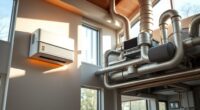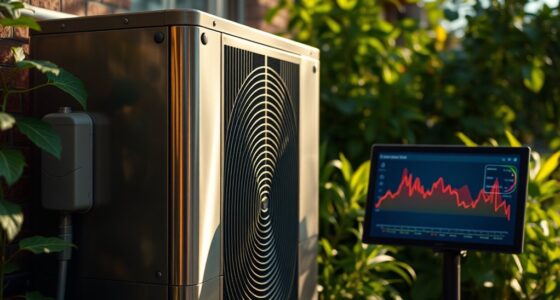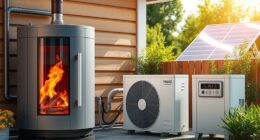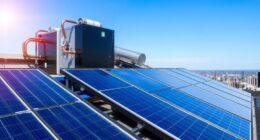Heat pumps substantially cut your home’s energy consumption by efficiently transferring heat instead of generating it, which boosts overall efficiency. They use less electricity compared to traditional systems and can harness renewable sources like solar power to further lower energy use and costs. Their ability to perform well across various climates means you’ll spend less on heating and cooling in the long run. To discover how these eco-friendly options can benefit your home, keep exploring.
Key Takeaways
- Heat pumps transfer heat efficiently, reducing overall home energy consumption compared to traditional heating and cooling systems.
- When combined with solar panels, they further decrease reliance on grid energy, lowering consumption.
- Modern heat pumps operate at high COP, producing more heat per unit of electricity, which minimizes energy use.
- Using heat pumps can lead to significant reductions in electricity bills due to improved efficiency.
- Their adaptability and integration with smart systems optimize energy use, further decreasing home energy consumption.

Heat pumps are transforming the way homeowners manage energy, offering an efficient alternative to traditional heating and cooling systems. They leverage renewable energy sources, such as ambient heat from the air, ground, or water, to provide heating, cooling, and hot water. This shift toward renewable integration means you’re reducing reliance on fossil fuels, which not only lowers your carbon footprint but also aligns with sustainable living goals. With advancements in technology, heat pumps now deliver significant efficiency improvements, making them a smart choice for energy-conscious homeowners.
By switching to a heat pump, you can drastically cut your home’s energy consumption. Unlike conventional systems that burn fuels or rely solely on electric resistance, heat pumps transfer heat rather than generate it, which makes them inherently more efficient. This efficiency is especially noticeable during moderate temperatures, where heat pumps can operate at high coefficients of performance (COP), sometimes exceeding 3 or 4. That means for every unit of electrical energy consumed, you get three or four units of heat. This efficiency not only reduces your electricity bills but also helps optimize your overall energy use, especially when paired with smart home systems or energy management solutions.
The integration of renewable energy sources with heat pumps enhances their efficiency even further. For instance, if your home’s electricity comes from solar panels, you can generate a significant portion of your energy on-site. This setup minimizes grid dependency and maximizes the benefits of renewable integration. During sunny days, your solar panels can power the heat pump, reducing your reliance on grid electricity and lowering your energy costs. Over time, this synergy between renewable sources and heat pump technology can result in substantial savings and a smaller environmental impact.
Furthermore, the efficiency improvements brought by modern heat pumps mean you’re less affected by fluctuations in energy prices. As electricity rates rise, your heat pump’s ability to produce more heating or cooling output per unit of energy becomes even more valuable. Plus, many heat pumps qualify for government incentives or rebates aimed at promoting renewable energy and energy efficiency, making the switch more affordable.
Additionally, understanding the various heat pump options and their features can help homeowners choose the most suitable system for their specific climate and needs.
Frequently Asked Questions
How Do Heat Pumps Perform in Extremely Cold Climates?
In extremely cold climates, heat pumps still work well, but you might notice some frost resistance issues. As temperatures drop, their efficiency decline can happen, making them less effective compared to milder conditions. However, modern cold-weather models are designed to tolerate lower temperatures better, maintaining warmth without excessive energy use. You should consider heat pumps with advanced frost resistance features to guarantee consistent performance during harsh winter months.
What Are the Long-Term Maintenance Costs of Heat Pumps?
Think of your heat pump as a well-loved car—it needs regular check-ups. You’ll likely spend a few hundred dollars annually on routine inspections and occasional component replacements, like filters or fans. While upfront costs are higher, proper maintenance prevents costly repairs and keeps it running efficiently. Over time, these costs are manageable, ensuring your heat pump provides reliable warmth without draining your wallet.
Can Heat Pumps Replace Traditional HVAC Systems Entirely?
Yes, heat pumps can substitute traditional HVAC systems entirely if your home is compatible and you’re willing to invest in installation costs. They provide both heating and cooling, making them a versatile choice. However, you should consider system compatibility to guarantee efficiency. The initial installation costs can be higher, but long-term savings on energy bills often offset this expense, making heat pumps a practical, eco-friendly alternative.
How Do Heat Pumps Impact Indoor Air Quality?
Think of your indoor air as a clear lake; heat pumps act like gentle filters, improving its quality. They circulate indoor air efficiently, often equipped with air filtration systems that reduce dust, allergens, and pollutants. This can lead to fresher, cleaner indoor air, making your home healthier. With proper maintenance, heat pumps enhance indoor air quality by ensuring pollutants are minimized and airflow remains fresh and balanced.
Are There Government Incentives for Installing Heat Pumps?
Yes, there are government incentives for installing heat pumps. You can benefit from rebate programs and tax credits that make upgrading more affordable. Many local and federal initiatives offer financial support, helping you save money upfront and reduce long-term energy costs. Check your state or federal resources to find specific programs available in your area, and take advantage of these incentives to make your home more energy-efficient.
Conclusion
By now, you see how heat pumps can markedly reduce your home’s energy use and lower utility bills. They’re an efficient, eco-friendly choice that can transform your comfort and savings. Are you ready to make the switch and enjoy the benefits? With their proven performance and sustainability, heat pumps could be just what you need to create a greener, more cost-effective home environment. Why wait to start saving and reducing your carbon footprint today?









